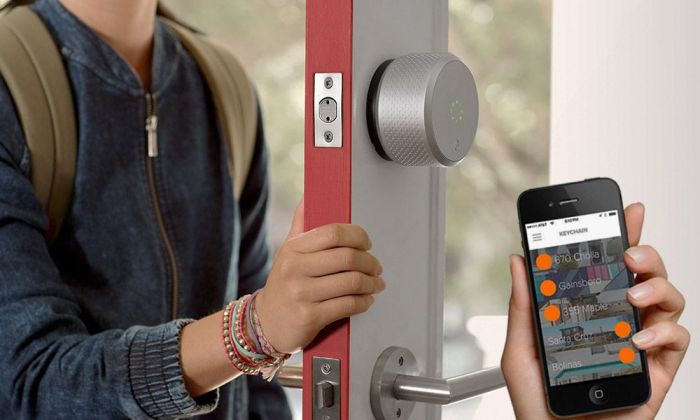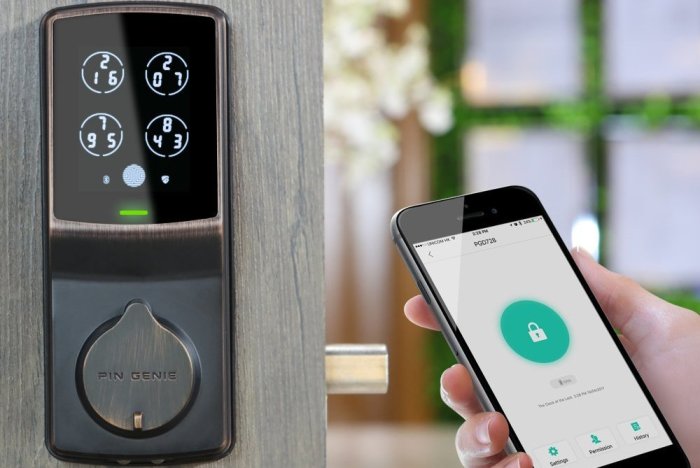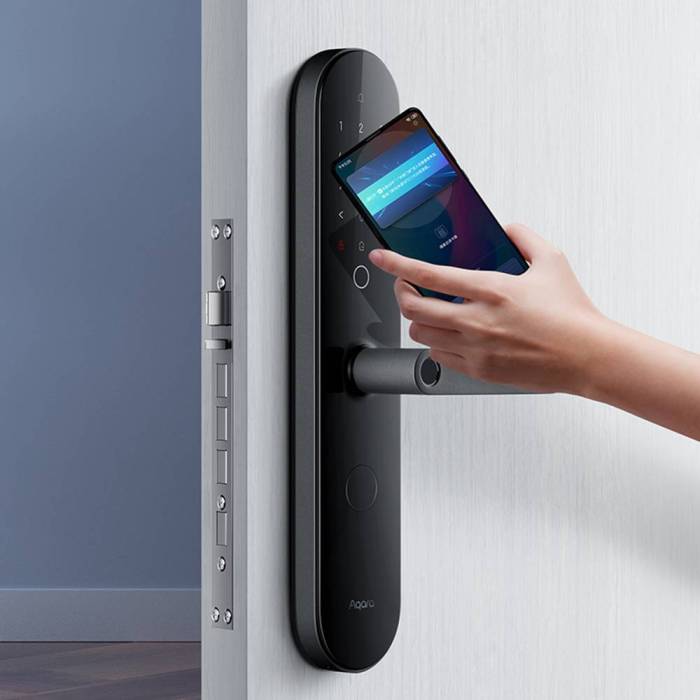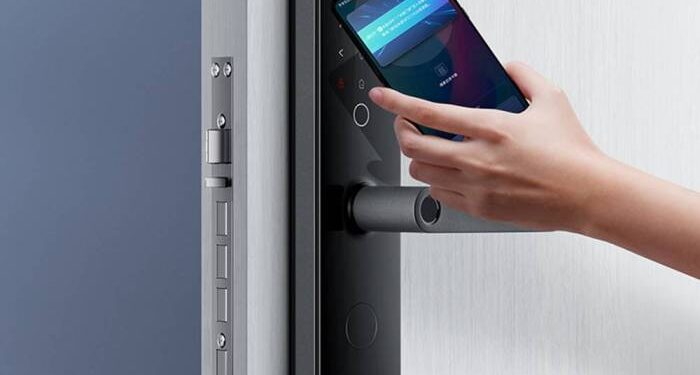Delving into the realm of Smart Front Door Locks to Consider in 2025, this article aims to provide a thorough exploration of the latest innovations and trends in home security technology. From biometric authentication to potential future advancements, we will cover it all.
Types of Smart Front Door Locks

Smart front door locks have revolutionized home security, offering convenience and advanced features compared to traditional locks. Let's explore the different types of smart front door locks available in the market and compare them with traditional locks in terms of security features.
We will also identify key features to consider when choosing a smart front door lock for your home.
1. Keypad Locks
Keypad locks allow homeowners to unlock their doors using a unique code instead of a physical key. This type of smart lock is convenient for families with multiple members or guests who need access to the house. Some keypad locks also come with features like temporary codes for visitors.
2. Biometric Locks
Biometric locks use fingerprints, facial recognition, or voice activation to grant access to the home. These locks provide a high level of security as they are difficult to breach without the authorized user's biometric data. Biometric locks are ideal for those looking for top-notch security.
3. Bluetooth/Wi-Fi Enabled Locks
Bluetooth or Wi-Fi enabled locks connect to your smartphone, allowing you to lock and unlock your door remotely. These locks often come with additional features like activity logs, remote access control, and integration with smart home systems. They are perfect for tech-savvy homeowners who want to monitor their home security on the go.
4. Key Fob Locks
Key fob locks work similarly to keyless entry systems in vehicles. Homeowners can unlock their doors with a small remote control that communicates with the lock. Key fob locks are convenient for those who prefer a hands-free approach to entering their homes.
Key Features to Consider:
- Security Level: Look for locks with advanced encryption and tamper-proof features to ensure the safety of your home.
- Integration: Consider smart locks that can be integrated with your existing smart home ecosystem for seamless control.
- Battery Life: Check the battery life of the lock and choose one that offers long-lasting performance to avoid frequent replacements.
- User Access: Opt for locks that allow you to create multiple user codes or access levels for added convenience and security.
Technology Trends in Smart Front Door Locks

The evolution of technology has significantly impacted the way we secure our homes, with smart front door locks being at the forefront of innovation. Let's delve into the latest technological advancements shaping the future of door security.Explainatory paragraph:One of the most notable trends in smart front door locks is the integration of biometric authentication.
Biometric features such as fingerprint recognition, facial recognition, and voice recognition are revolutionizing the concept of door security by providing a high level of accuracy and security. Gone are the days of traditional keys or keypad codes, as biometric authentication offers a more secure and convenient way to access your home.
Integration with Home Automation Systems
Smart front door locks are increasingly being integrated with home automation systems, allowing homeowners to control their locks remotely through their smartphones or other connected devices. This seamless integration enables users to monitor and manage access to their homes from anywhere, providing a heightened level of convenience and security.Overall, the technological advancements in smart front door locks are reshaping the way we approach home security, offering innovative solutions that prioritize both convenience and safety.
Security and Privacy Concerns

Smart front door locks offer convenience and enhanced security, but they also come with potential vulnerabilities that could compromise the safety of your home. It is essential to address these security and privacy concerns to ensure the optimal functioning of your smart lock system.
Potential Security Vulnerabilities
- One common security vulnerability with smart front door locks is the risk of hacking. Hackers may attempt to gain unauthorized access to your lock system through various means, such as exploiting weak passwords or using malware.
- Another concern is the possibility of physical tampering with the lock itself. Intruders could potentially bypass the smart lock by manipulating the hardware or breaking into the system.
- Additionally, the reliance on internet connectivity for smart locks poses a risk of network vulnerabilities. If the network is compromised, it could provide a gateway for hackers to access your lock system.
Tips to Enhance Privacy
- Regularly update your smart lock's firmware to ensure that any security patches are applied promptly, reducing the risk of exploitation by cybercriminals.
- Use strong, unique passwords for your smart lock system and avoid sharing access codes with unauthorized individuals to prevent unauthorized access.
- Implement multi-factor authentication for an added layer of security, requiring more than one form of verification to access your smart lock system.
- Enable notifications for any suspicious activity or unauthorized access attempts to stay informed and take immediate action to protect your home.
Encryption Protocols in Smart Lock Technology
Smart lock systems often utilize advanced encryption protocols to safeguard user data and ensure the privacy of personal information.
One common encryption protocol used in smart lock technology is AES (Advanced Encryption Standard), which provides secure communication between the smart lock and connected devices.
End-to-end encryption is another method employed by smart lock manufacturers to protect user data, ensuring that only authorized parties can access sensitive information.
Installation and Compatibility
Installing smart front door locks can vary depending on the model and brand you choose. Generally, the process involves removing your existing lock, replacing it with the smart lock, and setting it up through a mobile app.
Compatible Devices and Systems
Smart front door locks can work with a variety of devices and systems to enhance your home security and convenience. Some popular compatible devices and systems include:
- Smartphones: Most smart locks can be controlled via a smartphone app, allowing you to lock and unlock your door remotely.
- Voice Assistants: Smart locks that are compatible with voice assistants like Amazon Alexa or Google Assistant enable hands-free operation.
- Smart Home Hubs: Integrating your smart lock with a smart home hub such as Samsung SmartThings or Apple HomeKit can enhance automation and connectivity.
- Key Fobs: Some smart locks come with key fobs for easy access without needing a smartphone.
Troubleshooting Tips
If you encounter installation or compatibility issues with your smart front door lock, here are some troubleshooting tips:
- Ensure the lock is properly aligned and securely installed on your door.
- Check if the batteries are properly inserted and have enough power.
- Verify that your smartphone or device is compatible with the smart lock's app.
- Reset the lock and restart the setup process if you are experiencing connectivity issues.
Future Prospects and Innovations
As we look ahead to 2025, the evolution of smart front door locks is poised to bring about exciting advancements in home security technology. With rapid advancements in artificial intelligence and IoT, smart lock systems are expected to undergo significant transformations to enhance convenience, security, and integration with other smart home devices.
Potential New Features in Smart Lock Systems
- Biometric Recognition: Future smart locks may incorporate advanced biometric recognition technology, such as facial recognition or voice authentication, to further enhance security measures.
- Geofencing Capabilities: Smart locks could utilize geofencing technology to automatically unlock or lock doors based on the user's proximity to the home, offering seamless access control.
- Integration with Virtual Assistants: Integration with virtual assistants like Alexa or Google Assistant may become more sophisticated, allowing users to control their smart locks using voice commands.
- Advanced Encryption Protocols: To address security concerns, future smart lock systems may implement more robust encryption protocols to safeguard against cyber threats.
Impact of Artificial Intelligence on Smart Home Security
Artificial intelligence is poised to revolutionize the future of smart home security, including smart front door locks. AI algorithms can analyze user behavior patterns to detect anomalies and potential security breaches, enhancing overall protection. Additionally, AI-powered smart locks can learn user preferences and optimize security settings accordingly, offering personalized security solutions.
Final Wrap-Up
As we wrap up our discussion on Smart Front Door Locks to Consider in 2025, it's clear that the landscape of home security is rapidly evolving. Stay informed, stay secure, and embrace the future with these cutting-edge smart lock systems.
User Queries
What are the key features to consider when choosing a smart front door lock?
Some key features to consider include connectivity options, security protocols, ease of installation, and compatibility with your existing smart home devices.
How can I enhance the privacy of my smart lock systems?
Ensure your smart lock system is regularly updated with the latest firmware, use strong and unique passwords, and enable two-factor authentication whenever possible.
What potential new features can we expect in smart lock systems by 2025?
Potential new features may include enhanced AI integration for more personalized security settings, improved remote access capabilities, and seamless integration with voice assistants.
















